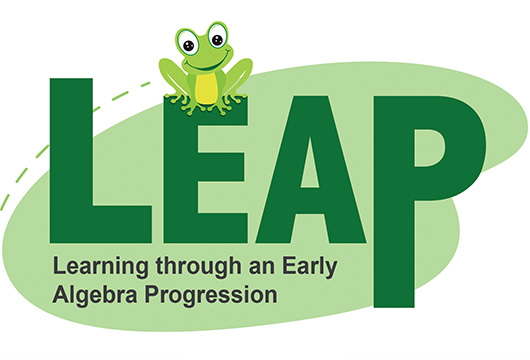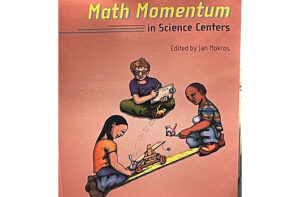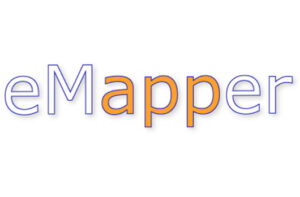Project LEAP
Developing a Grades K–5 Early Algebra Learning Progression (EALP) to foster young children’s algebraic thinking
Lead Staff:
Maria BlantonAngela Murphy Gardiner
Project Staff:
Sarah HillLEAP Curriculum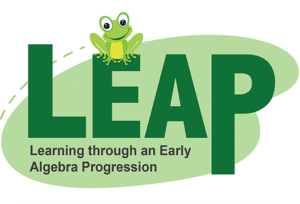
The LEAP program is the first early algebra curriculum for students in grades K-5. The research confirms that introducing algebra instruction in the early grades does impact future success.
The program:
- Is a coherent, connected approach to early algebra across the elementary grades
- Is accessible to all learners
- Will transform students’ thinking and build algebra readiness for middle and high school.
The program is structured so that algebraic concepts develop over time and across grades. The curriculum is connected and reflects a progression of increasingly sophisticated concepts across the grades. Throughout, there are a set of core algebraic thinking practices.
Learn More
Research Summary
Algebra is a subject with which students continue to struggle. A recommendation that has gained widespread acceptance is to adopt a longitudinal, K–12 approach to teaching and learning algebra. For this to succeed, work must be done to synthesize research on children’s algebraic thinking and to design an effective instructional approach to teaching and learning algebra in elementary grades. Project LEAP researchers have developed a Grades K–5 Early Algebra Learning Progression (EALP) to foster young children’s algebraic thinking and are testing its potential to improve children’s algebra-readiness for middle grades. Their EALP includes the following components:
- a curricular framework that specifies learning goals around core algebraic concepts and practices;
- an instructional sequence across Grades K–5 designed to achieve these goals;
- assessments that measure student learning in response to the instructional sequence; and
- descriptions of the increasingly sophisticated levels of thinking students exhibit around the core algebraic concepts and practices addressed in the instructional sequence.
Videos
Associated Projects[LEAP 6 (NSF)] The Impact of an Inclusive Grades K–2 Early Algebra Intervention Implemented by Classroom Teachers (2024-2028)
Maria Blanton, Principal Investigator
Angela Murphy Gardiner, Co-Principal Investigator (TERC)
Rena Stroud, Co-Principal Investigator (Merrimack College)
Bárbara Brizuela, Co-Principal Investigator (Tufts University)
Despina Stylianou, Co-Principal Investigator (CCNY-CUNY)
This project examines the effectiveness of our Grades K–2 Early Algebra Learning Progression (K–2 EALP) intervention when implemented by elementary teachers. The longitudinal, 3-year study uses an RCT design to study whether students taught the EALP intervention as part of their regular math curriculum significantly outperform students who receive only regular instruction on measures of algebra knowledge and general math knowledge. It also examines the fidelity with which teachers implement the intervention, what aspects of the intervention are implemented with high or low fidelity, and how variations in teachers’ fidelity of implementation are related to variations in students’ performance.
Supported by the U.S. National Science Foundation under Grant No. 2404984
Show More
Show Less
[LEAP 5] Identifying Effective Instructional Practices that Foster the Development of Algebraic Thinking in Elementary School (2017-2021)
Eric Knuth, Principal Investigator (University of Texas Austin) Maria Blanton, Co-Principal Investigator Angela Murphy Gardiner, Co-Principal Investigator Ana C. Stephens, Co-Principal Investigator (University of Wisconsin Madison) Rena Stroud, Co-Principal Investigator (Merrimack College) Despina Stylianou, Co-Principal Investigator (University of Texas Austin) The goals of this project are twofold: (1) to develop an early algebra classroom observational instrument; and (2) to identify profiles of instructional practices associated with increased student performance in early algebra. Supported by the National Science Foundation under Grant No. DRL #1721192
[LEAP 4 (NSF)] Building a Grades K-2 Early Algebra Learning Progression Prototype for Diverse Populations (2017-2021)
Maria Blanton, Principal Investigator Angela Murphy Gardiner, Co-Principal Investigator Ana C. Stephens, Co-Principal Investigator (University of Wisconsin Madison) Rena Stroud, Co-Principal Investigator (Merrimack College) Eric Knuth, Co-Principal Investigator (University of Texas Austin) This project focuses on the design of a Grades K–2 Early Algebra Learning Progression (EALP) that is responsive to culturally and linguistically diverse learners with exceptionalities, including learners with identified mathematics difficulties. Such a model will not only provide a critical roadmap for algebra instruction in elementary grades for our most vulnerable populations of students, it can also inform the design of more forward-thinking algebra learning standards. The project’s focus on a diverse population of learners promises to increase the generalizability of the EALP to wider-ranging populations. Supported by the National Science Foundation under Grant No. DRL #1720129
[LEAP 4 (IES)] Project LEAP: Extending a Grades 3-5 Early Algebra Learning Progression into Grades K-2 (2017-2021)
Maria Blanton, Principal Investigator Angela Murphy Gardiner, Co-Principal Investigator Ana C. Stephens, Co-Principal Investigator (University of Wisconsin Madison) Rena Stroud, Co-Principal Investigator (Merrimack College) Eric Knuth, Co-Principal Investigator (University of Texas Austin) Algebra is a subject with which students continue to struggle. One recommendation for improving algebra instruction that has gained widespread acceptance has been to adopt a longitudinal, K–12 approach to teaching and learning algebra, rather than waiting until secondary grades to begin students’ formal algebra education. To that end, this project will develop and test the potential of a Grades K–2 Early Algebra Learning Progression (EALP) to develop young children’s algebraic thinking and build a platform for their success in formal algebra in secondary grades. Supported by the Institute of Education Sciences, U.S. Department of Education, through Grant #R305A170378.
[LEAP 3] The Impact of a Teacher-Led Early Algebra Intervention on Children’s Algebra-Readiness for Middle School (2014-2020)
Maria Blanton, Principal Investigator Lindsay Demers, Principal Investigator Eric Knuth, Co-Principal Investigator (University of Texas Austin) Ana C. Stephens, Co-Principal Investigator (University of Wisconsin Madison) Early algebra is viewed as a critical means for preparing students for success in a more formal study of algebra in middle and secondary grades. The primary purpose of this project is to (1) use a large-scale, randomized study (CRT) to measure the effectiveness of a teacher-led, Grades 3–5 early algebra intervention, in demographically diverse settings, on children’s algebra readiness for middle school and (2) assess the fidelity with which elementary teachers implement the intervention in authentic, intact classrooms. Supported by the Institute of Education Sciences, U.S. Department of Education, through Grant #R305A140092.
[LEAP 2 RAPID] Retention of Early Algebraic Understanding (2015-2017)
Maria Blanton, Principal Investigator Eric Knuth, Co-Principal Investigator (University of Texas Austin) Ana C. Stephens, Co-Principal Investigator (University of Wisconsin Madison) This project extends NSF-funded research (DRL-1219605/06) on a quasi-experimental study of the impact of a 3-year, longitudinal early algebra intervention on children’s algebra readiness for middle grades. In particular, it explores students’ knowledge of core algebraic concepts once they enter middle grades, one year after their completion of the intervention. Supported by the National Science Foundation under Grant No. DRL #1550897.
[LEAP 2] The Impact of Early Algebra on Students’ Algebra Readiness (2012-2017)
Maria Blanton, Principal Investigator Eric Knuth, Co-Principal Investigator (University of Texas Austin) Ana C. Stephens, Co-Principal Investigator (University of Wisconsin Madison) This project uses a quasi-experimental design to test the effectiveness of a longitudinal early algebra intervention in grades 3-5 on children’s algebra readiness for middle grades, where the intervention in the small-scale study is taught by the research team. It draws from prior work (DRL – 1207945) in which we developed a grade 3–5 early algebra curricular progression, grade level instructional sequences, and associated assessments and uses these tools to gather preliminary efficacy data on the effectiveness of the intervention. Supported by the National Science Foundation under Grant No. DRL #1219605/06
[LEAP 1] Developing Algebra-Ready Students for Middle School: Exploring the Impact of Early Algebra (2009-2013)
Maria Blanton, Principal Investigator Eric Knuth, Co-Principal Investigator (University of Texas Austin) Ana C. Stephens, Co-Principal Investigator (University of Wisconsin Madison) This project developed a curricular learning progression of early algebra objectives and activities for students in grades 3-7. The goal of the work is to provide teachers with curricular guidance, instructional resources, and assessment tools that are useful in preparing students for success in the study of algebra at the middle grade level. Supported by the National Science Foundation under Grant No. DRL #1207945
Hands On! Articles
Learning standards such as the Common Core State Standards for Mathematics [CCSSM] (NGA Center & CCSSO, 2010) advocate that we develop students’ algebraic thinking beginning in kindergarten. Such a tall order requires innovative approaches that re-imagine what teaching and learning mathematics means for the elementary grades. But why would we want to teach algebra to children as young as age 5? The answer to that lies in understanding what we mean by algebra in the elementary grades—or, early algebra.
An interview with Maria Blanton about the new LEAP curriculum.
Building Solutions for Algebra Readiness
Feature // By Maria L. Blanton and Angela Murphy Gardiner, TERC; Eric Knuth, University of Texas Austin; Ana Stephens, University of Wisconsin Madison; Despina Stylianou, City College of New York; Rena Stroud, Merrimack College
Article in Education WeekCan Kindergarten Math Lay the Foundation for Algebra? New Study Aims to Find Out
Article on Project LEAP featuring an interview with Maria Blanton and Angela Gardiner.

The LEAP program is the first early algebra curriculum for students in grades K-5. The research confirms that introducing algebra instruction in the early grades does impact future success.
The program:
- Is a coherent, connected approach to early algebra across the elementary grades
- Is accessible to all learners
- Will transform students’ thinking and build algebra readiness for middle and high school.
The program is structured so that algebraic concepts develop over time and across grades. The curriculum is connected and reflects a progression of increasingly sophisticated concepts across the grades. Throughout, there are a set of core algebraic thinking practices.
Learn More

Algebra is a subject with which students continue to struggle. A recommendation that has gained widespread acceptance is to adopt a longitudinal, K–12 approach to teaching and learning algebra. For this to succeed, work must be done to synthesize research on children’s algebraic thinking and to design an effective instructional approach to teaching and learning algebra in elementary grades. Project LEAP researchers have developed a Grades K–5 Early Algebra Learning Progression (EALP) to foster young children’s algebraic thinking and are testing its potential to improve children’s algebra-readiness for middle grades. Their EALP includes the following components:
- a curricular framework that specifies learning goals around core algebraic concepts and practices;
- an instructional sequence across Grades K–5 designed to achieve these goals;
- assessments that measure student learning in response to the instructional sequence; and
- descriptions of the increasingly sophisticated levels of thinking students exhibit around the core algebraic concepts and practices addressed in the instructional sequence.
Videos
Associated Projects[LEAP 6 (NSF)] The Impact of an Inclusive Grades K–2 Early Algebra Intervention Implemented by Classroom Teachers (2024-2028)
Maria Blanton, Principal Investigator
Angela Murphy Gardiner, Co-Principal Investigator (TERC)
Rena Stroud, Co-Principal Investigator (Merrimack College)
Bárbara Brizuela, Co-Principal Investigator (Tufts University)
Despina Stylianou, Co-Principal Investigator (CCNY-CUNY)
This project examines the effectiveness of our Grades K–2 Early Algebra Learning Progression (K–2 EALP) intervention when implemented by elementary teachers. The longitudinal, 3-year study uses an RCT design to study whether students taught the EALP intervention as part of their regular math curriculum significantly outperform students who receive only regular instruction on measures of algebra knowledge and general math knowledge. It also examines the fidelity with which teachers implement the intervention, what aspects of the intervention are implemented with high or low fidelity, and how variations in teachers’ fidelity of implementation are related to variations in students’ performance.
Supported by the U.S. National Science Foundation under Grant No. 2404984
Show More
Show Less
[LEAP 5] Identifying Effective Instructional Practices that Foster the Development of Algebraic Thinking in Elementary School (2017-2021)
Eric Knuth, Principal Investigator (University of Texas Austin) Maria Blanton, Co-Principal Investigator Angela Murphy Gardiner, Co-Principal Investigator Ana C. Stephens, Co-Principal Investigator (University of Wisconsin Madison) Rena Stroud, Co-Principal Investigator (Merrimack College) Despina Stylianou, Co-Principal Investigator (University of Texas Austin) The goals of this project are twofold: (1) to develop an early algebra classroom observational instrument; and (2) to identify profiles of instructional practices associated with increased student performance in early algebra. Supported by the National Science Foundation under Grant No. DRL #1721192
[LEAP 4 (NSF)] Building a Grades K-2 Early Algebra Learning Progression Prototype for Diverse Populations (2017-2021)
Maria Blanton, Principal Investigator Angela Murphy Gardiner, Co-Principal Investigator Ana C. Stephens, Co-Principal Investigator (University of Wisconsin Madison) Rena Stroud, Co-Principal Investigator (Merrimack College) Eric Knuth, Co-Principal Investigator (University of Texas Austin) This project focuses on the design of a Grades K–2 Early Algebra Learning Progression (EALP) that is responsive to culturally and linguistically diverse learners with exceptionalities, including learners with identified mathematics difficulties. Such a model will not only provide a critical roadmap for algebra instruction in elementary grades for our most vulnerable populations of students, it can also inform the design of more forward-thinking algebra learning standards. The project’s focus on a diverse population of learners promises to increase the generalizability of the EALP to wider-ranging populations. Supported by the National Science Foundation under Grant No. DRL #1720129
[LEAP 4 (IES)] Project LEAP: Extending a Grades 3-5 Early Algebra Learning Progression into Grades K-2 (2017-2021)
Maria Blanton, Principal Investigator Angela Murphy Gardiner, Co-Principal Investigator Ana C. Stephens, Co-Principal Investigator (University of Wisconsin Madison) Rena Stroud, Co-Principal Investigator (Merrimack College) Eric Knuth, Co-Principal Investigator (University of Texas Austin) Algebra is a subject with which students continue to struggle. One recommendation for improving algebra instruction that has gained widespread acceptance has been to adopt a longitudinal, K–12 approach to teaching and learning algebra, rather than waiting until secondary grades to begin students’ formal algebra education. To that end, this project will develop and test the potential of a Grades K–2 Early Algebra Learning Progression (EALP) to develop young children’s algebraic thinking and build a platform for their success in formal algebra in secondary grades. Supported by the Institute of Education Sciences, U.S. Department of Education, through Grant #R305A170378.
[LEAP 3] The Impact of a Teacher-Led Early Algebra Intervention on Children’s Algebra-Readiness for Middle School (2014-2020)
Maria Blanton, Principal Investigator Lindsay Demers, Principal Investigator Eric Knuth, Co-Principal Investigator (University of Texas Austin) Ana C. Stephens, Co-Principal Investigator (University of Wisconsin Madison) Early algebra is viewed as a critical means for preparing students for success in a more formal study of algebra in middle and secondary grades. The primary purpose of this project is to (1) use a large-scale, randomized study (CRT) to measure the effectiveness of a teacher-led, Grades 3–5 early algebra intervention, in demographically diverse settings, on children’s algebra readiness for middle school and (2) assess the fidelity with which elementary teachers implement the intervention in authentic, intact classrooms. Supported by the Institute of Education Sciences, U.S. Department of Education, through Grant #R305A140092.
[LEAP 2 RAPID] Retention of Early Algebraic Understanding (2015-2017)
Maria Blanton, Principal Investigator Eric Knuth, Co-Principal Investigator (University of Texas Austin) Ana C. Stephens, Co-Principal Investigator (University of Wisconsin Madison) This project extends NSF-funded research (DRL-1219605/06) on a quasi-experimental study of the impact of a 3-year, longitudinal early algebra intervention on children’s algebra readiness for middle grades. In particular, it explores students’ knowledge of core algebraic concepts once they enter middle grades, one year after their completion of the intervention. Supported by the National Science Foundation under Grant No. DRL #1550897.
[LEAP 2] The Impact of Early Algebra on Students’ Algebra Readiness (2012-2017)
Maria Blanton, Principal Investigator Eric Knuth, Co-Principal Investigator (University of Texas Austin) Ana C. Stephens, Co-Principal Investigator (University of Wisconsin Madison) This project uses a quasi-experimental design to test the effectiveness of a longitudinal early algebra intervention in grades 3-5 on children’s algebra readiness for middle grades, where the intervention in the small-scale study is taught by the research team. It draws from prior work (DRL – 1207945) in which we developed a grade 3–5 early algebra curricular progression, grade level instructional sequences, and associated assessments and uses these tools to gather preliminary efficacy data on the effectiveness of the intervention. Supported by the National Science Foundation under Grant No. DRL #1219605/06
[LEAP 1] Developing Algebra-Ready Students for Middle School: Exploring the Impact of Early Algebra (2009-2013)
Maria Blanton, Principal Investigator Eric Knuth, Co-Principal Investigator (University of Texas Austin) Ana C. Stephens, Co-Principal Investigator (University of Wisconsin Madison) This project developed a curricular learning progression of early algebra objectives and activities for students in grades 3-7. The goal of the work is to provide teachers with curricular guidance, instructional resources, and assessment tools that are useful in preparing students for success in the study of algebra at the middle grade level. Supported by the National Science Foundation under Grant No. DRL #1207945
Hands On! Articles
Learning standards such as the Common Core State Standards for Mathematics [CCSSM] (NGA Center & CCSSO, 2010) advocate that we develop students’ algebraic thinking beginning in kindergarten. Such a tall order requires innovative approaches that re-imagine what teaching and learning mathematics means for the elementary grades. But why would we want to teach algebra to children as young as age 5? The answer to that lies in understanding what we mean by algebra in the elementary grades—or, early algebra.
An interview with Maria Blanton about the new LEAP curriculum.
Building Solutions for Algebra Readiness
Feature // By Maria L. Blanton and Angela Murphy Gardiner, TERC; Eric Knuth, University of Texas Austin; Ana Stephens, University of Wisconsin Madison; Despina Stylianou, City College of New York; Rena Stroud, Merrimack College
Article in Education WeekCan Kindergarten Math Lay the Foundation for Algebra? New Study Aims to Find Out
Article on Project LEAP featuring an interview with Maria Blanton and Angela Gardiner.
[LEAP 6 (NSF)] The Impact of an Inclusive Grades K–2 Early Algebra Intervention Implemented by Classroom Teachers (2024-2028)
Maria Blanton, Principal Investigator
Angela Murphy Gardiner, Co-Principal Investigator (TERC)
Rena Stroud, Co-Principal Investigator (Merrimack College)
Bárbara Brizuela, Co-Principal Investigator (Tufts University)
Despina Stylianou, Co-Principal Investigator (CCNY-CUNY)
This project examines the effectiveness of our Grades K–2 Early Algebra Learning Progression (K–2 EALP) intervention when implemented by elementary teachers. The longitudinal, 3-year study uses an RCT design to study whether students taught the EALP intervention as part of their regular math curriculum significantly outperform students who receive only regular instruction on measures of algebra knowledge and general math knowledge. It also examines the fidelity with which teachers implement the intervention, what aspects of the intervention are implemented with high or low fidelity, and how variations in teachers’ fidelity of implementation are related to variations in students’ performance.
Supported by the U.S. National Science Foundation under Grant No. 2404984
[LEAP 5] Identifying Effective Instructional Practices that Foster the Development of Algebraic Thinking in Elementary School (2017-2021)
Eric Knuth, Principal Investigator (University of Texas Austin) Maria Blanton, Co-Principal Investigator Angela Murphy Gardiner, Co-Principal Investigator Ana C. Stephens, Co-Principal Investigator (University of Wisconsin Madison) Rena Stroud, Co-Principal Investigator (Merrimack College) Despina Stylianou, Co-Principal Investigator (University of Texas Austin) The goals of this project are twofold: (1) to develop an early algebra classroom observational instrument; and (2) to identify profiles of instructional practices associated with increased student performance in early algebra. Supported by the National Science Foundation under Grant No. DRL #1721192
[LEAP 4 (NSF)] Building a Grades K-2 Early Algebra Learning Progression Prototype for Diverse Populations (2017-2021)
Maria Blanton, Principal Investigator Angela Murphy Gardiner, Co-Principal Investigator Ana C. Stephens, Co-Principal Investigator (University of Wisconsin Madison) Rena Stroud, Co-Principal Investigator (Merrimack College) Eric Knuth, Co-Principal Investigator (University of Texas Austin) This project focuses on the design of a Grades K–2 Early Algebra Learning Progression (EALP) that is responsive to culturally and linguistically diverse learners with exceptionalities, including learners with identified mathematics difficulties. Such a model will not only provide a critical roadmap for algebra instruction in elementary grades for our most vulnerable populations of students, it can also inform the design of more forward-thinking algebra learning standards. The project’s focus on a diverse population of learners promises to increase the generalizability of the EALP to wider-ranging populations. Supported by the National Science Foundation under Grant No. DRL #1720129
[LEAP 4 (IES)] Project LEAP: Extending a Grades 3-5 Early Algebra Learning Progression into Grades K-2 (2017-2021)
Maria Blanton, Principal Investigator Angela Murphy Gardiner, Co-Principal Investigator Ana C. Stephens, Co-Principal Investigator (University of Wisconsin Madison) Rena Stroud, Co-Principal Investigator (Merrimack College) Eric Knuth, Co-Principal Investigator (University of Texas Austin) Algebra is a subject with which students continue to struggle. One recommendation for improving algebra instruction that has gained widespread acceptance has been to adopt a longitudinal, K–12 approach to teaching and learning algebra, rather than waiting until secondary grades to begin students’ formal algebra education. To that end, this project will develop and test the potential of a Grades K–2 Early Algebra Learning Progression (EALP) to develop young children’s algebraic thinking and build a platform for their success in formal algebra in secondary grades. Supported by the Institute of Education Sciences, U.S. Department of Education, through Grant #R305A170378.
[LEAP 3] The Impact of a Teacher-Led Early Algebra Intervention on Children’s Algebra-Readiness for Middle School (2014-2020)
Maria Blanton, Principal Investigator Lindsay Demers, Principal Investigator Eric Knuth, Co-Principal Investigator (University of Texas Austin) Ana C. Stephens, Co-Principal Investigator (University of Wisconsin Madison) Early algebra is viewed as a critical means for preparing students for success in a more formal study of algebra in middle and secondary grades. The primary purpose of this project is to (1) use a large-scale, randomized study (CRT) to measure the effectiveness of a teacher-led, Grades 3–5 early algebra intervention, in demographically diverse settings, on children’s algebra readiness for middle school and (2) assess the fidelity with which elementary teachers implement the intervention in authentic, intact classrooms. Supported by the Institute of Education Sciences, U.S. Department of Education, through Grant #R305A140092.
[LEAP 2 RAPID] Retention of Early Algebraic Understanding (2015-2017)
Maria Blanton, Principal Investigator Eric Knuth, Co-Principal Investigator (University of Texas Austin) Ana C. Stephens, Co-Principal Investigator (University of Wisconsin Madison) This project extends NSF-funded research (DRL-1219605/06) on a quasi-experimental study of the impact of a 3-year, longitudinal early algebra intervention on children’s algebra readiness for middle grades. In particular, it explores students’ knowledge of core algebraic concepts once they enter middle grades, one year after their completion of the intervention. Supported by the National Science Foundation under Grant No. DRL #1550897.
[LEAP 2] The Impact of Early Algebra on Students’ Algebra Readiness (2012-2017)
Maria Blanton, Principal Investigator Eric Knuth, Co-Principal Investigator (University of Texas Austin) Ana C. Stephens, Co-Principal Investigator (University of Wisconsin Madison) This project uses a quasi-experimental design to test the effectiveness of a longitudinal early algebra intervention in grades 3-5 on children’s algebra readiness for middle grades, where the intervention in the small-scale study is taught by the research team. It draws from prior work (DRL – 1207945) in which we developed a grade 3–5 early algebra curricular progression, grade level instructional sequences, and associated assessments and uses these tools to gather preliminary efficacy data on the effectiveness of the intervention. Supported by the National Science Foundation under Grant No. DRL #1219605/06
[LEAP 1] Developing Algebra-Ready Students for Middle School: Exploring the Impact of Early Algebra (2009-2013)
Maria Blanton, Principal Investigator Eric Knuth, Co-Principal Investigator (University of Texas Austin) Ana C. Stephens, Co-Principal Investigator (University of Wisconsin Madison) This project developed a curricular learning progression of early algebra objectives and activities for students in grades 3-7. The goal of the work is to provide teachers with curricular guidance, instructional resources, and assessment tools that are useful in preparing students for success in the study of algebra at the middle grade level. Supported by the National Science Foundation under Grant No. DRL #1207945
Hands On! Articles
Learning standards such as the Common Core State Standards for Mathematics [CCSSM] (NGA Center & CCSSO, 2010) advocate that we develop students’ algebraic thinking beginning in kindergarten. Such a tall order requires innovative approaches that re-imagine what teaching and learning mathematics means for the elementary grades. But why would we want to teach algebra to children as young as age 5? The answer to that lies in understanding what we mean by algebra in the elementary grades—or, early algebra.
An interview with Maria Blanton about the new LEAP curriculum.
Building Solutions for Algebra Readiness
Feature // By Maria L. Blanton and Angela Murphy Gardiner, TERC; Eric Knuth, University of Texas Austin; Ana Stephens, University of Wisconsin Madison; Despina Stylianou, City College of New York; Rena Stroud, Merrimack College
Article in Education WeekCan Kindergarten Math Lay the Foundation for Algebra? New Study Aims to Find Out
Article on Project LEAP featuring an interview with Maria Blanton and Angela Gardiner.
Learning standards such as the Common Core State Standards for Mathematics [CCSSM] (NGA Center & CCSSO, 2010) advocate that we develop students’ algebraic thinking beginning in kindergarten. Such a tall order requires innovative approaches that re-imagine what teaching and learning mathematics means for the elementary grades. But why would we want to teach algebra to children as young as age 5? The answer to that lies in understanding what we mean by algebra in the elementary grades—or, early algebra.
An interview with Maria Blanton about the new LEAP curriculum.
Building Solutions for Algebra Readiness
Feature // By Maria L. Blanton and Angela Murphy Gardiner, TERC; Eric Knuth, University of Texas Austin; Ana Stephens, University of Wisconsin Madison; Despina Stylianou, City College of New York; Rena Stroud, Merrimack College
Can Kindergarten Math Lay the Foundation for Algebra? New Study Aims to Find Out
Article on Project LEAP featuring an interview with Maria Blanton and Angela Gardiner.
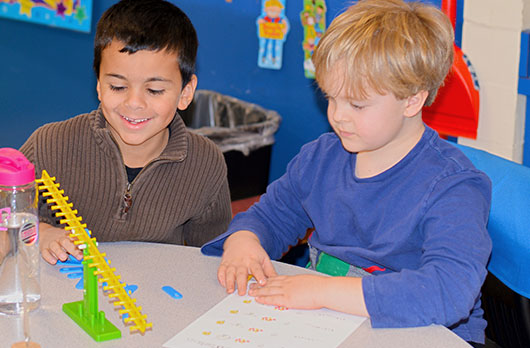
University of Wisconsin Madison
University of Texas Austin
Merrimack College
City College of New York
Tufts University
Institute of Education Sciences
U.S. Department of Education
National Science Foundation
Share This Page:

